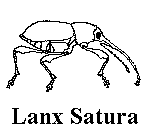
Ambrose Bierce,
Write It Right:
A Little Blacklist of Literary Faults
1909

 |
Ambrose Bierce, Write It Right: A Little Blacklist of Literary Faults 1909 |
 |
|
Novel for Romance. In a novel there is at least an apparent attention to considerations of probability; it is a narrative of what might occur. Romance flies with a free wing and owns no allegiance to likelihood. Both are fiction, both works of imagination, but should not be confounded. They are as distinct as beast and bird. Link | November 10, 2004
| Comments (0)
Numerous for Many. Rightly used, numerous relates to numbers, but does not imply a great number. A correct use is seen in the term numerous verse—verse consisting of poetic numbers; that is, rhythmical feet. Link | November 11, 2004
| Comments (0)
OObnoxious for Offensive. Obnoxious means exposed to evil. A soldier in battle is obnoxious to danger. Link | November 12, 2004
| Comments (0)
Occasion for Induce, or Cause. “His arrival occasioned a great tumult.” As a verb, the word is needless and unpleasing. Link | November 13, 2004
| Comments (0)
Occasional Poems. These are not, as so many authors and compilers seem to think, poems written at irregular and indefinite intervals, but poems written for occasions, such as anniversaries, festivals, celebrations and the like. Link | November 14, 2004
| Comments (0)
Of Any for Of All. “The greatest poet of any that we have had.” Link | November 15, 2004
| Comments (0)
Offhanded and Offhandedly. Offhand is both adjective and adverb; these are bastard forms. Link | November 16, 2004
| Comments (0)
On the Street. A street comprises the roadway and the buildings at each side. Say, in the street. He lives in Broadway. Link | November 17, 2004
| Comments (0)
Only. “He only had one.” Say, He had only one, or, better, one only. The other sentence might be taken to mean that only he had one; that, indeed, is what it distinctly says. The correct placing of only in a sentence requires attention and skill. Link | November 19, 2004
| Comments (0)
Opine for Think. The word is not very respectably connected. Link | November 20, 2004
| Comments (0)
Opposite for Contrary. “I hold the opposite opinion.” “The opposite practice.” Link | November 21, 2004
| Comments (0)
Or for Nor. Probably our most nearly universal solecism. “I cannot see the sun or the moon.” This means that I am unable to see one of them, though I may see the other. By using nor, I affirm the invisibility of both, which is what I wanted to do. If a man is not white or black he may nevertheless be a Negro or a Causcasian; but if he is not white nor black he belongs to some other race. See Neither. Link | November 22, 2004
| Comments (0)
Ovation. In ancient Rome an ovation was an inferior triumph accorded to victors in minor wars or unimportant battle. Its character and limitations, like those of the triumph, were strictly defined by law and custom. An enthusiastic demonstration in honor of an American civilian is nothing like that, and should not be called by its name. Link | November 24, 2004
| Comments (0)
Over for About, In, or Concerning. “Don’t cry over spilt milk.” “He rejoiced over his acquittal.” Link | November 25, 2004
| Comments (0)
Over for More than. “A sum of over ten thousand dollars.” “Upward of ten thousand dollars” is equally objectionable. Link | November 26, 2004
| Comments (0)
Over for On. “The policeman struck him over the head.” If the blow was over the head it did not hit him. Link | November 27, 2004
| Comments (0)
Over with. “Let us have it over with.” Omit with. A better expression is, Let us get done with it. Link | November 28, 2004
| Comments (0)
Pair for Pairs. If a word has a good plural use each form in its place. Link | November 30, 2004
| Comments (0)
Pants for Trousers. Abbreviated from pantaloons, which are no longer worn. Vulgar exceedingly. Link | December 01, 2004
| Comments (0)
Party for Person. “A party named Brown.” The word, used in that sense, has the excuse that it is a word. Otherwise it is no better than “pants” and “gent.” A person making an agreement, however, is a party to that agreement. Link | December 03, 2004
| Comments (0)
Pay for Give, Make, etc. “He pays attention.” “She paid a visit to Niagara.” It is conceivable that one may owe attention or a visit to another person, but one cannot be indebted to a place. Link | December 05, 2004
| Comments (0)
Pay. “Laziness does not pay.” “It does not pay to be uncivil.” This use of the word is grossly commercial. Say, Indolence is unprofitable. There is no advantage in incivility. Link | December 06, 2004
| Comments (0)
Peek for Peep. Seldom heard in England, though common here. “I peeked out through the curtain and saw him.” That it is a variant of peep is seen in the child’s world peek-a-book, equivalent to bo-peep. Better use the senior word. Link | December 07, 2004
| Comments (0)
Peculiar for Odd, or Unusual. Also sometimes used to denote distinction, or particularity. Properly a thing is peculiar only to another thing, of which it is characteristic, nothing else having it; as knowledge of the use of fire is peculiar to Man. Link | December 08, 2004
| Comments (0)
People for Persons. “Three people were killed.” “Many people are superstitious.” People has retained its parity of meaning with the Latin populus, whence it comes, and the word is not properly used except to designate a population, or large fractions of it considered in the mass. To speak of any stated or small number of persons as people is incorrect. Link | December 09, 2004
| Comments (0)
Comment ProblemsDear readers: A few weeks ago I was forced to turn off comments by the ever-increasing flood of comment spam, much of it incredibly filthy. That, and a new job, have interfered with my daily posting schedule. I hope to have the comment problem solved in the next few days: it's not as easy as it ought to be. Even before that, daily posts should continue as long as I'm at home. (I will be out of town December 2nd-5th.) As long as this is the last post, you will know that comments are still turned off. As soon as it disappears, you may comment at will. Thank you for your patience. Link | December 09, 2004
| Comments (0)
|
Lanx Satura:
About the Lanx Satura Project
About Write It Right Other authors: Gracián: Oráculo Manual Bridges: Nero M. R. James: Ghost Stories
Archives:
Monthly:
December 2004 November 2004 October 2004 September 2004 August 2004 July 2004 June 2004 May 2004 April 2004 March 2004
Favorite Sites:
My Home Page: Curculio
About Last Night Armavirumque 2Blowhards Cranky Professor Cronaca A. C. Douglas God of the Machine
Support This Site:
Search:
|